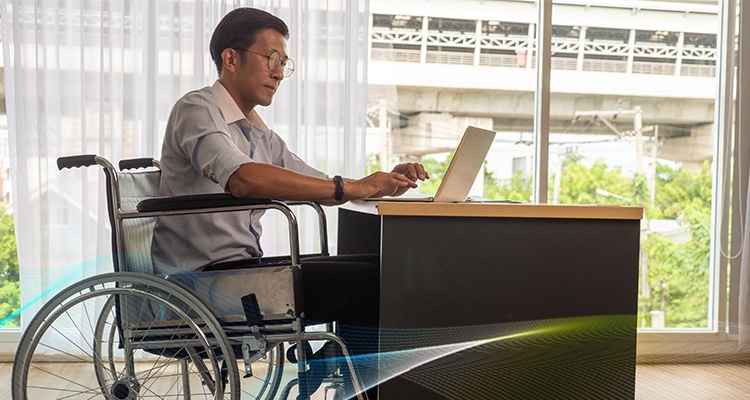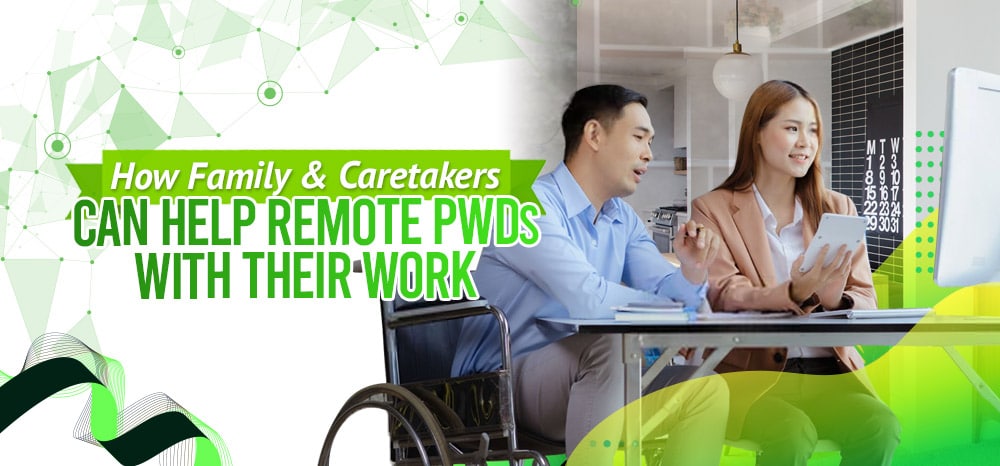The pandemic, and the subsequent shift to remote work, have helped open more work opportunities for Persons with Disabilities (PWDs). Not only is remote work more convenient for PWDs, but it’s also safer as well. Despite these advantages, remote work for PWDs also has its own challenges, such as adjusting to their new daily routines.
Fortunately, remote PWDs won’t be facing these challenges alone. Another advantage of remote work is allowing the families and caretakers of PWD workers to help them with their work. The question now is, how exactly can they provide PWD support at home?
To answer this question, here are ways a PWD worker’s family can support them with their disability and working from home. Of course, all remote workers benefit from the support of their families and caretakers. In the case of PWD workers, however, appropriate support can really bolster their productivity and confidence in their ability to work.

Don’t Do Their Work for Them.
A common mistake made by the families of remote PWD workers in trying to help them is doing their work for them. Doing this defeats the reasons they got a job in the first place. How can they utilize and improve their skills if you’re doing their jobs for them?
In addition, letting PWD workers do their work and helping only when needed shows that you believe in them. This show of trust will boost their self-confidence and motivate them to prove you right. Of course, if they require assistance, don’t hesitate to lend a hand in solving their problem.

Give Them Space to Do Their Work.
Another thing that you can do to provide PWD support at home is by giving them the space they need for their work. Having an appropriate workspace limits the number of distractions that can take away their focus from their work. It also gives them a place to store all their assistive tools as well.
So how much space do you need to provide for their remote work for PWDs? The answer depends on the kind of work they’re doing and their condition. What matters is that their workspace should not make them feel claustrophobic when they’re on it. If they’re uncomfortable with their workspace, then their productivity would suffer.

Give Rewards for a Job Well Done.
In today’s uncertain and confusing environment, it’s very challenging to remain motivated to work at your best. Despite what some may believe, PWDs are not ignorant of current events. They also feel anxious and uncertain about their futures and the future of their families.
One way families and caretakers can help alleviate these uncertainties is by reminding them of the present. You can do this by giving rewards for their efforts once in a while. These rewards don’t need to be expensive nor grand. It could be as simple as making their favorite food or telling them that they did a good job today.

Take Time for Yourself and Your Other Family Members.
When helping your working PWD loved one, don’t forget to take care of yourself as well. Yes, it is good that you’re very supportive of their work. But that doesn’t mean that you should sacrifice your health and other family members in doing so. Doing so leads to exhaustion and the inability to help your other family members when they need your help.
Give yourself time to relax and rest so that you can be at your best when your PWD worker loved one requests your assistance. Looking like you’re about to collapse will also make them worry about you instead of their work. You can also use this time to bond with the other members of your family as well.

Be There When They Need You.
In my experience, the silent assurance from your loved ones is already a big help in motivating me for work. That is why I think that the simple act of supporting your loved one’s endeavors is a crucial yet overlooked way of helping them. Your presence, or lack of, influences the confidence of your loved ones in themselves and their work.
This tip ties in with all the previous ones that I’ve mentioned above. This advice is what allows you to do all of the other ones mentioned in this article. Sometimes, a simple hug goes a long way than a large workspace in a house without you in it.

Conclusion.
The increase of remote work for PWDs is both a boon and a challenge for PWDs. But with the help of their family and loved ones, adjusting to work from home can be made easier. I hope that this article will help guide you in helping your loved ones in this new and unfamiliar work environment.

